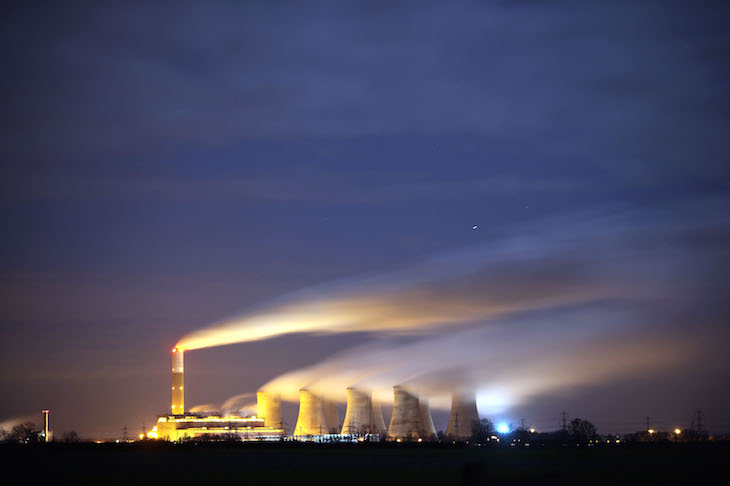Many remarkable things happened immediately after the Brexit referendum. One is often overlooked: The House of Commons adopted the Fifth Carbon Budget, reaffirming the targets of the Climate Change Act 2008. More than half of the greenhouse gas emission reduction in the UK is due to policies and measures that originate in Brussels rather than in London. In 2014, one quarter of UK emission reductions were achieved by paying companies in Eastern Europe to reduce theirs instead. Brexit will have a profound effect on three central planks of UK climate policy – nuclear power, interconnection, and permit trade – but the government pretends that nothing will change.
When he was energy secretary, Ed Miliband pushed nuclear power as a zero-carbon option to provide baseload electricity. Later governments stuck to his plans. Hinkley C is well-known, but ten more new nuclear power plants are foreseen. Theresa May has announced that leaving the European Union implies that the European Court of Justice will have no more say in the UK. This means leaving Euratom, the body that regulates the civilian application of nuclear material. Outside Euratom, the UK is a rogue state. EdF would break the laws of France if it would sell nuclear equipment to the UK, and would face sanctions in every country it does business. Its engineers risk arrest if they return from Somerset. Work on Hinkley C will therefore stop until the UK has its regulations in order. This involves setting up a new regulator and having it certified by the International Atomic Energy Agency, a process that has yet to be start but will take years to complete. With nuclear power severely delayed, Brexit implies that the UK will burn more gas and perhaps coal to keep the lights on, and emit more carbon dioxide than planned.
Interconnection is another way to reduce emissions. New underwater cables would allow us to import wind power from Denmark, nuclear power from France, hydropower from Norway and even geothermal power frorm Iceland. But electricity markets are heavily regulated. Interconnectors buy power in one market to sell it in another, and thus face two regulators. While the UK government has publicly focussed on fixing imaginary problems in the retail market, the European Commission has quietly worked to improve the broken wholesale market in Great Britain. Investors like the Commission’s technocratic and predictable approach to regulation, and the harmonisation of rules across Europe. With the prospect of power market regulation returning to the populist ways of Westminster, investment in interconnection has been put on hold. Carbon dioxide emissions will rise as a result.
The UK led the design of the EU Emissions Trading System (ETS) and greatly benefitted from it. Instead of reducing emissions at home, we pay companies abroad to reduce theirs. The climate does not care where the carbon dioxide comes from, so this is a good deal for all. Brexit means turning our backs on that. London is a major hub in permit trade. That will end on Brexit day, with some £10 billion in turnover and hundreds of jobs moving to Frankfurt. More importantly, emissions will now have to be reduced in the UK. The cost of climate policy is reckoned to be somewhere between 0.5 and 1.0 per cent of GDP in 2020. Without access to cheap imports, that will go up by 0.2 – 0.4 per cent. An exit from the ETS alone would cost £70 to £140 million per week.
It does not have to be this way. Switzerland’s permit market will be linked to the EU’s, with disputes settled by the Permanent Court of Arbitration. The UK has been a member of the PCA since its inception in 1899. The agreement with Switzerland took five years to negotiate. The Clean Growth Strategy, published last week, makes clear that the Department of Business, Energy and Industrial Strategy has yet to realise that the UK will be out of the ETS on Brexit day. The Committee on Climate Change is clinging to the idea, against much evidence, that the UK will be self-sufficient in emission reduction. In other words, the UK government has yet to acknowledge the need to prepare for the necessary negotiations.
The examples above share a common theme. There is a lack of preparation for Brexit. This is not limited to climate policy, but repeated in all areas of government. Since joining the European Union in 1973, government tasks have been offshored, the regulatory functions of Whitehall have atrophied, and the competence of Westminster politicians has withered. Brexit means that government roles will be repatriated, but the events of the last 16 months have made clear that the civil service is not equal to this task, while politicians retreat further into their fantasies. Taking back control requires an ability to exercise control, and that is lacking.
Richard Tol teaches economics at the University of Sussex and the Vrije Universiteit Amsterdam.






Comments